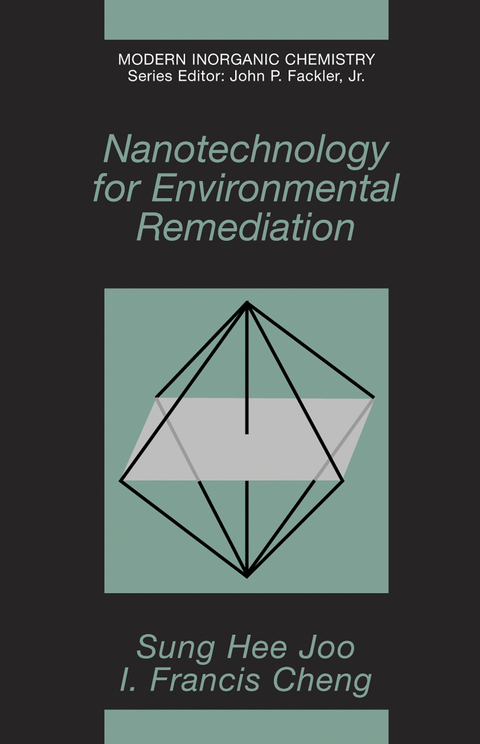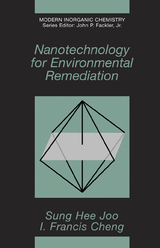Nanotechnology for Environmental Remediation
Seiten
2006
Springer-Verlag New York Inc.
978-0-387-28825-3 (ISBN)
Springer-Verlag New York Inc.
978-0-387-28825-3 (ISBN)
Examines the suitability of nanoscale Zero-Valent Iron (ZVI) for degradation of agrochemicals for the purpose of developing treatment technology. This book identifies by-products produced from the ZVI-mediated degradation process of particular contaminants, and clarifies the reaction mechanism by which ZVI degrades a chosen contaminant.
The book covers the recently discovered oxidative process driven by zero-valent iron (ZVI) in the presence of oxygen and a further developed system which is named ZEA (Zero-valent iron, EDTA, Air). Future potential applications for en- ronmentalremediationusingthisprocessarealsodiscussed. Theoxidativeprocess wasdiscoveredduringthecourseofmolinate(athiocarbamateherbicide)degra- tion experiments. Both ferrous iron and superoxide (or, at pH < 4. 8, hydroperoxy) radicals appear to be generated on corrosion of the ZVI with resultant production of strongly oxidizing entities capable of degrading the trace contaminant. Fenton oxidationandoxidativeby-productswereobservedduringnanosizedZVI(nZV- mediateddegradationofmolinateunderaerobicconditions. Toassessthepotential applicationofnZVIforoxidativetransformationoforganiccontaminants,thec- version of benzoic acid (BA) to p-hydroxybenzoic acid (p-HBA) was used as a probe reaction. When nZVI was added to BA-containing water, an initial pulse of p-HBA was detected during the ?rst 30 minutes, followed by the slow generation of additional p-HBA over periods of at least 24 hours.
The ZEA system showed that chlorinated phenols, organophosphorus and EDTA have been degraded. The mechanism by which the ZEA reaction proceeds is hypothesized to be through reactive oxygen intermediates. The ZVI-mediated oxidation and ZEA system may be useful for in situ applications of nZVI particles and may also provide a means of oxidizing organic contaminants in granular ZVI-containing permeable reactive barriers. The purpose of this book is to provide information on the recently discovered chemical process, which could revolutionize the treatment of pesticides and c- taminated water. It also aims to offer signi?cant insights to the knowledge for potential applications of ZVI-based technology. Oxidative degradation of herbicides (e. g.
The book covers the recently discovered oxidative process driven by zero-valent iron (ZVI) in the presence of oxygen and a further developed system which is named ZEA (Zero-valent iron, EDTA, Air). Future potential applications for en- ronmentalremediationusingthisprocessarealsodiscussed. Theoxidativeprocess wasdiscoveredduringthecourseofmolinate(athiocarbamateherbicide)degra- tion experiments. Both ferrous iron and superoxide (or, at pH < 4. 8, hydroperoxy) radicals appear to be generated on corrosion of the ZVI with resultant production of strongly oxidizing entities capable of degrading the trace contaminant. Fenton oxidationandoxidativeby-productswereobservedduringnanosizedZVI(nZV- mediateddegradationofmolinateunderaerobicconditions. Toassessthepotential applicationofnZVIforoxidativetransformationoforganiccontaminants,thec- version of benzoic acid (BA) to p-hydroxybenzoic acid (p-HBA) was used as a probe reaction. When nZVI was added to BA-containing water, an initial pulse of p-HBA was detected during the ?rst 30 minutes, followed by the slow generation of additional p-HBA over periods of at least 24 hours.
The ZEA system showed that chlorinated phenols, organophosphorus and EDTA have been degraded. The mechanism by which the ZEA reaction proceeds is hypothesized to be through reactive oxygen intermediates. The ZVI-mediated oxidation and ZEA system may be useful for in situ applications of nZVI particles and may also provide a means of oxidizing organic contaminants in granular ZVI-containing permeable reactive barriers. The purpose of this book is to provide information on the recently discovered chemical process, which could revolutionize the treatment of pesticides and c- taminated water. It also aims to offer signi?cant insights to the knowledge for potential applications of ZVI-based technology. Oxidative degradation of herbicides (e. g.
Literature Review.- Nanoscale ZVI Particles Manufacture and Analytical Techniques.- Oxidative Degradation of the Thiocarbamate Herbicide, Molinate, Using Nanoscale ZVI.- Molecular Oxygen Activation by FeII/IIIEDTA as a Form of Green Oxidation Chemistry.- Quantification of the Oxidizing Capacity of Nanoparticulate Zero-Valent Iron and Assessment of Possible Environmental Applications.- Conclusions and Future Research Needs.
| Reihe/Serie | Modern Inorganic Chemistry |
|---|---|
| Zusatzinfo | XIII, 165 p. |
| Verlagsort | New York, NY |
| Sprache | englisch |
| Maße | 156 x 235 mm |
| Themenwelt | Naturwissenschaften ► Biologie ► Ökologie / Naturschutz |
| Naturwissenschaften ► Chemie ► Anorganische Chemie | |
| Technik ► Umwelttechnik / Biotechnologie | |
| ISBN-10 | 0-387-28825-2 / 0387288252 |
| ISBN-13 | 978-0-387-28825-3 / 9780387288253 |
| Zustand | Neuware |
| Informationen gemäß Produktsicherheitsverordnung (GPSR) | |
| Haben Sie eine Frage zum Produkt? |
Mehr entdecken
aus dem Bereich
aus dem Bereich
Planung · Recht · Verfahren
Buch | Hardcover (2024)
Springer Vieweg (Verlag)
64,99 €
Lehrbuch zu Grundlagen, Technologie und Praxis
Buch | Hardcover (2022)
Hanser (Verlag)
34,99 €




